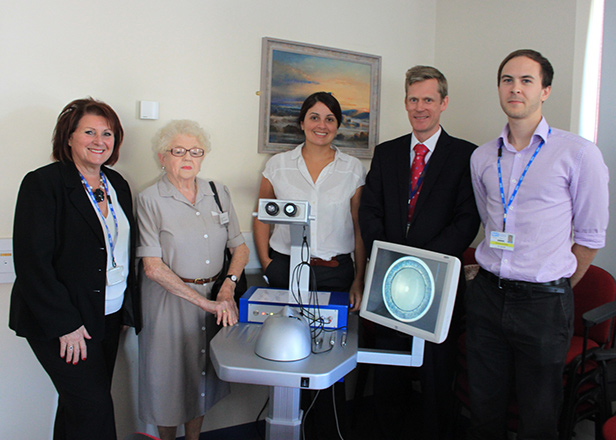
From left. Christine Hardwick, RBCH Postgraduate Medical Centre Manager; Margaret Neville, Chairman of Friends of the Bournemouth Eye Unit; Lindsey Sturman, Fundraising Manager of Bournemouth Hospital Charity; Mr James Kersey, Consultant Ophthalmologist and Dr David Saunders, trainee ophthalmologist
A state of the art cataract simulator has arrived at the Royal Bournemouth Hospital’s (RBH) Eye Unit to improve training for surgeons. Generous charitable donations have enabled RBH to be the first in the Wessex region to get such a simulator.
The new simulator will enable surgeons of all levels to practise the micro surgical skills required for cataract surgery in a safe and predictable environment outside of the operating theatre. Cataract surgery is one of the most common procedures performed at RBH, with approximately 3,500 procedures performed each year, and the simulator is a welcome addition to the existing training programme.
The simulator was funded by charitable donations of £80,000 from the Wessex Deanery and £20,000 from the Friends of the Bournemouth Eye Unit. Funding for a Simulation Training Lead was provided by the Bournemouth Hospital Charity. The Wessex Deanery is commissioned by NHS Health Education England to provide postgraduate medical training for Dorset, Hampshire, Isle of Wight, South Wiltshire and the States of Jersey.
Mr James Kersey, Consultant Ophthalmologist at RBH, said: “There are only about 20 such simulators in the UK, so we are delighted to have one here at Bournemouth. We are extremely grateful to the Wessex Deanery and to the Friends of the Bournemouth Eye Unit who have been key in bringing the simulator to our Eye Unit.”
Surgeons of all levels will make use of the simulator. It enables junior doctors to practise basic technique – how to hold the tools and to get used to the spatial awareness and movements involved. For senior trainees the simulator allows the practise of specific techniques or to create different scenarios or complications.
Mr Kersey explained: “Historically, new surgeons practised on things like tomatoes to develop their key skills. They would very rapidly train with patients – doing only very small parts of each operation and slowly built up their skills. This simulator means that the level of skill is much higher, allowing trainees to get 40-50 hours of practice before operating on a patient and makes their training during surgery much more efficient.
“Having this simulator here at the Royal Bournemouth is fantastic. Surgeons can fit simulator time around their shifts and they don’t need to travel to another hospital which might be far away or only offer restricted training times.”
As well as providing an excellent training opportunity for doctors at RBH, the simulator will also be available for training opportunities for surgeons from hospitals further afield and within the Wessex region.






